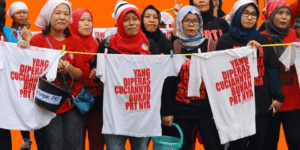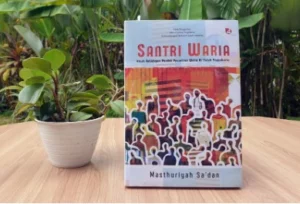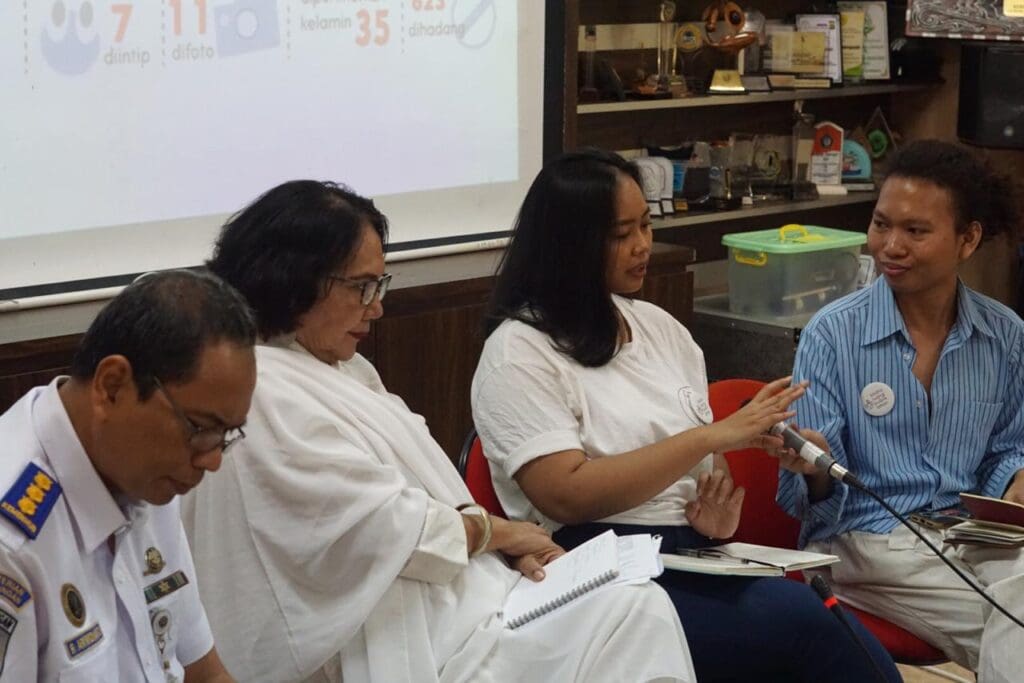The struggle to re-knit tolerance that was torn apart took place in remote parts of the archipelago. Konde.co, together with The Asian Muslim Action Network (AMAN Indonesia) and supported by UN Women, brought up the story of that struggle in a special issue of #Fightingfortolerance at the Peace Innovation Academy. This article will air for a week, on April 28-May 4, 2022.
Aceh, an area at the west end of Indonesia, is often included in the national news because of the large number of intolerance there; this seems to be a story that will never end.
The most recent is research released by the Setara Institute on 3 regions in Aceh, namely Banda Aceh, Langsa and Sabang, which are included in the list of the 10 most intolerant cities in Indonesia.
This article is one way to answer the curiosity of minority groups who decide to live in Aceh: why are they still able to survive even though they have to compromise with conditions, rejected by their environment because they are not Muslims?
To answer this, Khalida Zia met with 5 people from different backgrounds to find out their views on Aceh and the problems of intolerance they faced.
Anisa, you are beautiful when you wear a hijab.
Anisa (not Muslim), not her real name. She often receives this utterance, “You are beautiful when you wear the hijab.”
Anisa often receives this remark, even though she is not a Muslim. But because she occasionally wears a headscarf to adapt to the habits of people living in Aceh, people around her are starting to compare Anisa’s face: whether she is beautiful or not when she wears the hijab.
Since then, there have been a lot of questions directed at Anisa about this. As well as questions about how it feels to be a religious minority in Aceh because Anisa is not Muslim, whereas in Aceh almost all of them are Muslim. Of course, the answer cannot be explained easily.
In junior high and senior high school, Anisa was often the subject of discussion because she was judged to be different. When she left the house, she didn’t wear a headscarf; when she went to school, she didn’t either. But there are moments when Anisa feels uncomfortable because she is constantly being watched by the environment around her. So she decided to wear a headscarf every now and then. Until high school and college, Anisa chose to wear the hijab more often.
Anisa thought that after wearing the hijab more often, the problem would be solved. But it didn’t. Once upon a time, someone asked her to pray because they saw Anisa wearing a headscarf; Anisa said she was not a Muslim. But this answer raises many new questions for them.
“But why are you wearing a headscarf? It covers your real identity?”
So Anisa is getting confused because sometimes what kind of answer she has to give to explain these two different identities.
For Muslim friends, Anisa feels that sometimes they are happy that Anisa often wears the hijab, maybe they feel that Anisa will start converting to Islam one day, and this is not a problem for Anisa. However, many of her friends from minority religions felt uncomfortable seeing Anisa wearing a headscarf. Although like Anisa, they also sometimes have to wear the hijab and use it for specific needs.
Many have similar experiences, but they choose to remain silent. They use the hijab to adapt to their environment.
But Anisa is also sometimes shunned by friends from her religious minority group because they think that Anisa has lost her faith. After all, she occasionally wears the hijab.
“If we could choose, of course, we would live where we can be accepted and be ourselves without being seen as different. But of course, not everyone can choose this. There are job demands, there are families, and some are forced to stay here to find food. The strangest thing also happened when a friend joked, you’re prettier when you wear a hijab.”
“Some think this is a normal joke because Anisa is considered a minority, but if the conditions were reversed, ‘You would be beautiful when you open your hijab.’ If Anisa says this to the majority here, will this also be considered a normal joke?” Anisa said.
So finally, Anisa will wear the hijab when she likes it and not use it when she doesn’t like it. The hijab for Anisa then became fashion, not a matter of heart or belief.
Anisa is also happy to be able to match colours and now has 1 hijab collection wardrobe; and once surprised her family when they saw her collection.
“If I lived in an environment that didn’t wear the hijab, I might be comfortable being like them because I live here; I sometimes feel comfortable wearing the hijab. But I’m happy now that I chose this because of myself and not because of being influenced by others,” said Anisa.
Fitri, Eliminated From Access to Residence
Fitri (not Muslim), not her real name, is 45 years old. She is a Christian woman married to a Caucasian or a foreign citizen. So legally, she will not get recognition for land ownership in Indonesia. While living in Banda Aceh from 2015 to 2022, she chose to rent a house.
However, if you live in Aceh and are going to rent a house, your religious identity will be one of the things that are in question. When going to rent a house, as usual, Fitri first conducts a survey, looks at suitable areas and meets the owner if interested.
But here, when we say that we are Christians, it turns out that not everyone refuses to rent out their houses, even many of them. The house was previously rented out.
“Obviously, I know that because of my religious identity,” she said.
Mawar, not her real name, experienced the same thing. She has just bought land in Surin, Jalan Pemancar and has already made a sale and purchase transaction with the house owner. However, after the owner of the house found out that Mawar was a Christian, the local residents did not allow them to live there, and now she is in trouble for this reason.
Another story also emerged from a religious minority woman who was going to study in Banda Aceh, specifically in the Darussalam area. There are 2 largest public campuses in Aceh, but apparently, a religious minority from Manado who was looking for a boarding house stated that it was difficult to find a boarding house around the campus. Some even put up an iron sign: the house is only for Muslims.
This problem can be overcome for female students with sufficient financial conditions. But imagine if they have unstable economic conditions, they have to work and compromise with the environment, which is not easy.
From this story, some people are increasingly asking questions. There is a big fear often wrapped in the name of religion here; I don’t know what fear it is.
Fitri remembers many times when going out of Aceh for work or vacation, many feel free from that burden. But when she came back here, he was like someone who got a responsibility that sometimes made her unable to think anymore. Sometimes, she thinks this is what it’s like to be in the minority.
Even though, as a person with sufficient economic capacity, Fitri feels that Aceh is a comfortable area because her life is not too complex, and the price of basic needs is lower than in other big cities. Although Fitri did not expect to spend old age here. She thinks a tolerant city like Salatiga is more desirable as a place for her old age.
Tari, We are not immigrants; Transgender is also part of Aceh.
This condition is also faced by transgender people living in Aceh, with a more negative stigma attached to them.
In 2015, when Tari, not her real name, decided to change her masculine identity to a feminine one, Tari believed everyone had the same opportunity to choose this identity.
At first, her parents were surprised, but when her sister said to the family, “It’s okay, she just wants to be herself and let her be.” After hearing that, Tari’s struggle to be herself can finally begin.
Tari was born and grew up here, unlike many conditions that often deny that they are not Acehnese. Many of them said that transgender people like Tari came from Medan, and this is a rumour that often appears in the community.
“Maybe it’s part of their way to remove our identity from Aceh,” said Tari.
In her daily activities, Tari faces ridicule, being shouted at as a transwoman, popularly called “waria” (wanita-pria or female-male), and gets caught in an Aceh’s sharia police officers, locally known as the Wilayatul Hisbah raid.
“This is a daily thing that has become part of our lives, and it doesn’t matter to me. I learned to give people time to get to know us. Because we used to have a long process before becoming who we are now.”
However, the worst stigma circulating is that when a disaster occurs, it is often associated with the existence of Tari and her fellow transgender friends.
“Disasters happen because transgenders bring disasters, then can waria be that great at managing disasters? I thought to myself.”
So far, their existence is not accepted, their work is disturbed, and no single law takes sides.
“I still want to stay here because Aceh is my identity; I don’t expect to be treated specially; I just want to be accepted where I was born and grew up here,” said Tari.
Anis Must Go to Private School
Anis (not Muslim) is a Taekwondo athlete, has studied Taekwondo since elementary school, and has won many Taekwondo competitions.
There was a time when Anis would be in the news because she had just won a match. But because she brought the school’s name, Anis was told to wear a headscarf. Anis didn’t want to because her mother didn’t allow it.
In the end, the next day, it was not Anis who entered the newspaper but someone else because the person was changed, and that was without Anis’ approval.
There was also a time when PON (National Sports Week) Anis won many times in the selection process, but when she was about to take part in the PON match, Anis was about to be replaced because the Aceh Dispora at that time did not want to send Anis who was a non-Muslim to represent Aceh without wearing a headscarf. But their attempt failed because Anis’s coach from Korea fought for it.
“I fought until I was crushed and bleeding on the mat, but Aceh did not acknowledge my existence then.”
During religious lessons, Anis usually listens, although you can go out if you want. Anis remembers there was a moment when the religious teacher asked:
“Is there something like this in your religion? Sometimes, the treatment makes it uncomfortable because it is questioned in front of other students. And we had our own religious hour when we would go to church. So our religious scores are given to schools by the church.”
Anis also remembers that in 2012 when Anis was in the first grade of high school, she was required to wear a hijab at school. And the religious score she knew was given by the church; she got a 9. But on the school report card, suddenly, the number changed to 6.5, so her religious score at that time was red on the report card.
“After that, I decided to move to the Budidharma school, even though when I said I wanted to move, the principal tried to hold me back because they wanted me to stay in school, but I still chose to move. And at the new school, I had outstanding support. But maybe the situation is different now because, in the past, there were fewer minorities, and now it feels more crowded,” said Anis.
Vina, Christian Religion Teacher
The Banda Aceh Methodist Christian School is close to the value of diversity built between the students and teachers.
Once, a junior high school student who was drinking water and was suddenly surprised to see the arrival of someone wearing a headscarf spontaneously stopped drinking and covered his drinking bottle.
There, Vina, not her real name, is a teacher, telling about her experience when she first came to Aceh. Initially, she entered Aceh in 2017 to become a Christian religious educator for junior high, high school and college students in Aceh. Before Covid-19 hit, a male Buddhist student moved here; even though this student was in grade 3, he transferred from a public school because he often felt ridiculed at his old school.
“Interestingly, at first glance, these students do not get ridiculed by their friends, but sometimes also by their teachers. Once, this student was questioned by his teacher in a religious lesson at a public school. Why does your Lord want to be appointed like that? So yes, in the end, many are uncomfortable in some of the public schools here,” said Vina.
But the more we come here, the fewer problems; according to Vina, it could be because many schools are online, and there are no more direct interactions.
In a moment of sports competitions, for example, at first glance, students still get discriminated against when competitions require a selection process. In this selection, they sometimes get the treatment that makes it difficult for minorities.
“If there is an official or campus competition and we are often invited, the competition makes the difference. For example, for a debate competition, female students are usually required to wear long skirts, while sometimes not all of them have long skirts, then most of the practice activities are carried out on Sundays, even though it is our day of worship, “said Vina.
Here at the Banda Aceh Methodist school, there are Christian schools for elementary, middle and high school levels, but currently, 80 percent of the teachers are Muslim, and 70 percent of the students are Buddhists. For schools, the most important thing is that teachers can understand and provide the learning that students need, so religious issues are not the main problem.
And what’s interesting is that currently there are 2 students, 1 girl and 1 boy, who are Muslims. They are in grade 7, and according to their parents, they come here because they are considered more disciplined.
“With the many differences in this school and their existence as a minority in Aceh, we teach students to be tolerant not only in religious and PPKN lessons but also in our daily lives here. So if it’s the fasting month like this, some teachers fast, and students usually understand not to eat and drink in front of their teacher, like before, because they forgot and saw the Muslim in front of them; they were drinking, and then they were shocked, and their reflexes would immediately move away. So that’s our process of learning about diversity. If there are teachers who celebrate Lebaran, we will come; if there is a Chinese New Year celebration, we will also visit, as well as Christmas, so it is very diverse.”
Likewise, Muslim students hold our Bibles here, and that’s allowed.
“What’s interesting is that now there are students who say, “Mom, next year I want to continue in a public school. I was surprised that it meant they were more prepared than they used to be. In the past, some feared going to public school, but now they are more daring. But I don’t know whether the factor is because the school is online so that interaction between students is reduced or there are other factors, maybe because there are relatively few competitions nowadays.”
Minority Hope
Tolerance is not a big thing, but it must start with small things from yourself. How you see and accept the differences around you. And this is not just a story about religion. If we are a minority, rest assured our voice is essential, and it is time for our stories to be heard.
If we want to be treated well, we treat others well. If you are in the minority here, it could be that you are the majority in a new place after moving. What’s wrong with accepting differences without being equated. Do I have to buy land and build boarding houses or houses for us minorities so that we can be accepted?
Many hope Aceh will one day become more open to differences and involve all levels of society without exception in its policymaking so that there will be no more discriminatory policies for anyone.
(The views expressed in the articles presented at the Peace Innovation Academy are those of the participants and do not necessarily represent the views of UN Women, the United Nations, or their affiliated organizations)
Translated by: Marina Nasution













